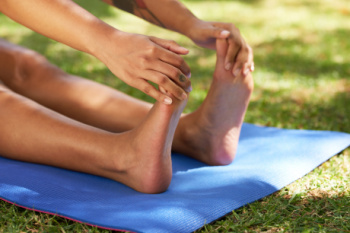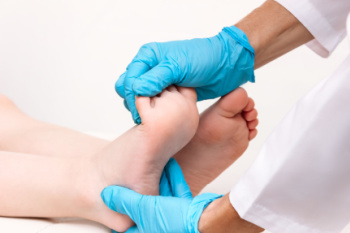
Foot arthritis can cause pain, stiffness, and reduced mobility, making daily activities more challenging. It often develops from wear and tear on the joints, inflammation, or conditions such as rheumatoid arthritis. Regular foot exercises can help improve flexibility, reduce discomfort, and strengthen the surrounding muscles. The plantar fascia stretch involves gently pulling the toes back to stretch the bottom of the foot, easing tension and improving movement. A calf stretch helps loosen the Achilles tendon and reduce strain on the heel. Rolling a golf ball under the foot massages the plantar fascia, promoting circulation and relieving tightness. Additionally, marble pick-ups strengthen the toes by encouraging small movements that improve coordination and flexibility. If you have arthritis that is affecting your feet, it is suggested that you consult a podiatrist who can help you find relief, and also recommend additional foot stretches.
Arthritis can be a difficult condition to live with. If you are seeking treatment, contact Naim G. Shaheed, DPM from Ankle and Foot Centers of Georgia. Our doctor can provide the care you need to keep you pain-free and on your feet.
Arthritic Foot Care
Arthritis is a joint disorder that involves the inflammation of different joints in your body, such as those in your feet. Arthritis is often caused by a degenerative joint disease and causes mild to severe pain in all affected areas. In addition to this, swelling and stiffness in the affected joints can also be a common symptom of arthritis.
In many cases, wearing ill-fitting shoes can worsen the effects and pain of arthritis. Wearing shoes that have a lower heel and extra room can help your feet feel more comfortable. In cases of rheumatoid arthritis, the arch in your foot may become problematic. Buying shoes with proper arch support that contour to your feet can help immensely.
Alleviating Arthritic Pain
- Exercises that stretch the foot can prevent further pain and injury and increase mobility
- Most of the pain can be alleviated with anti-inflammatory drugs, heat, and topical medications
- Massages can help temporarily alleviate pain.
It is best to see your doctor for the treatment that is right for your needs and symptoms. Conditions vary, and a podiatrist can help you determine the right method of care for your feet.
If you have any questions, please feel free to contact one of our offices located in Lithonia/Stonecrest and Emory/Midtown, GA . We offer the newest diagnostic tools and technology to treat your foot and ankle needs.

Children’s foot health is essential for their overall growth and development. Common conditions that may affect their feet include bowed legs, flat feet, in-toeing, out-toeing, and curly toes. Bowed legs are often seen in toddlers and usually resolve as they grow. Flat feet, where the arch does not develop properly, may cause discomfort or pain but often improve with age. In-toeing and out-toeing, where the feet turn inward or outward while walking, can be normal in young children but may need attention if they persist. Additionally, curly toes, where one or more toes bend toward others, can cause irritation or difficulty finding comfortable shoes. If your child has any kind of foot condition, it is suggested that you consult a podiatrist who can offer appropriate treatment solutions.
Making sure that your children maintain good foot health is very important as they grow. If you have any questions, contact Naim G. Shaheed, DPM of Ankle and Foot Centers of Georgia. Our doctor can provide the care you need to keep you pain-free and on your feet.
Keeping Children's Feet Healthy
Having healthy feet during childhood can help prevent medical problems later in life, namely in the back and legs. As children grow, their feet require different types of care. Here are some things to consider...
Although babies do not walk yet, it is still very important to take care of their feet.
Avoid putting tight shoes or socks on his or her feet.
Allow the baby to stretch and kick his or her feet to feel comfortable.
As a toddler, kids are now on the move and begin to develop differently. At this age, toddlers are getting a feel for walking, so don’t be alarmed if your toddler is unsteady or ‘walks funny’.
As your child gets older, it is important to teach them how to take care of their feet.
Show them proper hygiene to prevent infections such as fungus.
Be watchful for any pain or injury.
Have all injuries checked by a doctor as soon as possible.
Comfortable, protective shoes should always be worn, especially at play.
If you have any questions please feel free to contact one of our offices located in Lithonia/Stonecrest and Emory/Midtown, GA . We offer the newest diagnostic and treatment technologies for all your foot and ankle needs.

Pregnancy brings significant changes to the body, including the feet. Increased foot size is common due to hormonal changes that relax ligaments, causing the arches to flatten and the feet to lengthen. Many women experience heel pain and plantar fasciitis as extra weight places stress on the foot’s supportive structures. Swollen feet result from fluid retention and reduced circulation, leading to discomfort and tightness in shoes. Balance issues may arise as the center of gravity shifts, making walking more challenging. Additionally, flat feet can develop as the arches lose support, leading to fatigue and strain. Wearing supportive footwear, staying hydrated, and elevating the feet can help alleviate discomfort. If you are experiencing foot pain during your pregnancy, it is suggested that you consult a podiatrist who can determine what the cause is, and offer effective relief tips.
Pregnant women with swollen feet can be treated with a variety of different methods that are readily available. For more information about other cures for swollen feet during pregnancy, consult with Naim G. Shaheed, DPM from Ankle and Foot Centers of Georgia. Our doctor will attend to all of your foot and ankle needs.
What Foot Problems Can Arise During Pregnancy?
One problem that can occur is overpronation, which occurs when the arch of the foot flattens and tends to roll inward. This can cause pain and discomfort in your heels while you’re walking or even just standing up, trying to support your baby.
Another problem is edema, or swelling in the extremities. This often affects the feet during pregnancy but tends to occur in the later stages.
How Can I Keep My Feet Healthy During Pregnancy?
- Wearing orthotics can provide extra support for the feet and help distribute weight evenly
- Minimize the amount of time spent walking barefoot
- Wear shoes with good arch support
- Wear shoes that allow for good circulation to the feet
- Elevate feet if you experience swelling
- Massage your feet
- Get regular, light exercise, such as walking, to promote blood circulation to the feet
If you have any questions please feel free to contact one of our offices located in Lithonia/Stonecrest and Emory/Midtown, GA . We offer the newest diagnostic and treatment technologies for all your foot and ankle needs.









